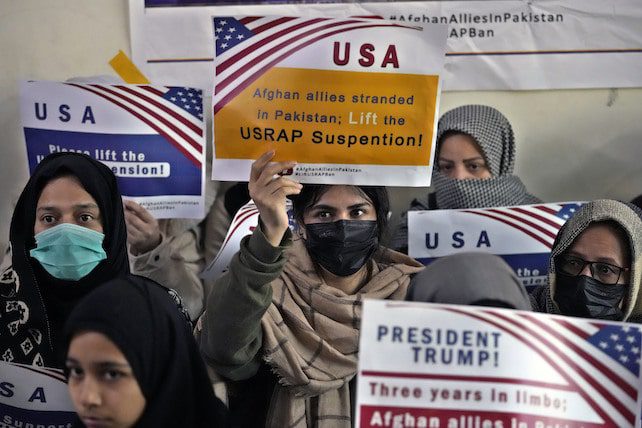Visa applicants must complete an interview before they can enter the U.S. However, there is no U.S. embassy in Afghanistan, so applicants must travel to a country where they can have the interview in person prior to being approved. These “in-between” countries are known as “lily pads.”
RELATED: Fact Check: Do Refugee Resettlement Organizations Promote Illegal Immigration?
“The U.S. has had agreements with a number of countries,” such as Qatar and Albania, “to receive Afghans temporarily while they finish that interview process,” said Rice. The U.S. government pays to transport Afghans by means of the organization Coordinator for Afghan Relocation Efforts (CARE) and Enduring Welcome.
On March 4, Congressmen Michael V. Lawler, Michael T. McCaul, and Richard Hudson sent a letter urging President Trump not to permanently shut down CARE. “Such a decision would abandon over 200,000 wartime allies and have lasting consequences for America’s global credibility, military operations, and veterans,” says the letter. “These are not random applicants or illegal migrants who’ve crossed the Southern border as a result of the failures of the previous Administration.”
“Every individual in the Enduring Welcome pipeline served alongside American forces, risked their lives for our mission, and was promised a path to safety,” the letter continues. “The Afghans in this program are the most vetted immigrants in U.S. history having undergone extensive screening by DHS, DOD, FBI, CIA, and the State Department.”
“The Taliban considers anyone who worked with the U.S. to be an enemy,” the Congressmen note. “They are being hunted, detained, and executed.”
“We urge you to reconsider any possible efforts to permanently shut down CARE and Enduring Welcome before we can save our allies,” the Congressmen say. “You can ensure that the door is closed on this chapter of American history with one last successful act of redemption and honor.”
If CARE does not facilitate the transporting of Afghans seeking SIVs, “the other option for Afghans has been to go to a country on their own that processes SIVs through our embassies,” said Rice. “That means they have to secure their own visa to go to that country. And there are very limited countries that would receive Afghans.”
One of those countries that has been willing is Pakistan, so many Afghans have gone there. “But Pakistan doesn’t want Afghans there,” Rice said, “so it’s been very difficult to get and keep renewing temporary visas [so applicants can] wait in Pakistan for their interview.”
Afghans who want to come to the U.S. but do not qualify for an SIV might have the option to come as refugees if they have other qualifying circumstances. “Refugees can’t ask to come to the U.S.,” said Rice. They have to “be recommended by someone.”
For example, an Afghan who did not work for the U.S. military but did work for another entity, such as the U.S. embassy or an NGO, could be recommended for entry into the United States.

